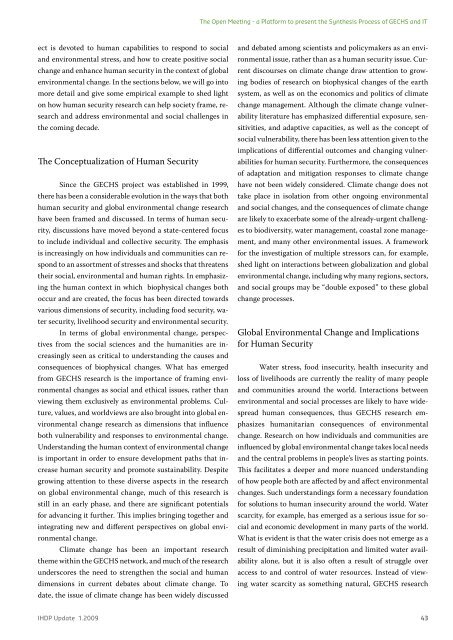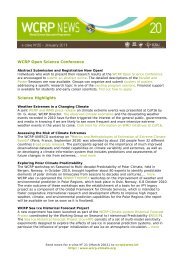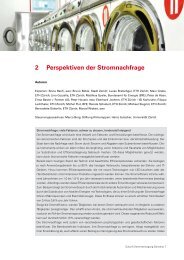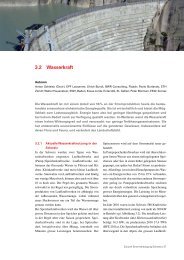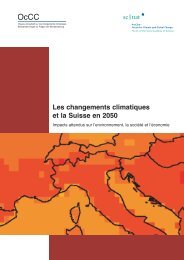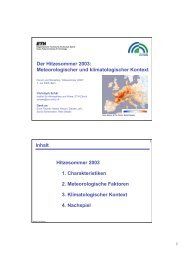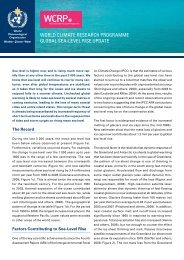Open - IHDP - United Nations University
Open - IHDP - United Nations University
Open - IHDP - United Nations University
You also want an ePaper? Increase the reach of your titles
YUMPU automatically turns print PDFs into web optimized ePapers that Google loves.
ect is devoted to human capabilities to respond to social<br />
and environmental stress, and how to create positive social<br />
change and enhance human security in the context of global<br />
environmental change. In the sections below, we will go into<br />
more detail and give some empirical example to shed light<br />
on how human security research can help society frame, research<br />
and address environmental and social challenges in<br />
the coming decade.<br />
The Conceptualization of Human Security<br />
Since the GECHS project was established in 1999,<br />
there has been a considerable evolution in the ways that both<br />
human security and global environmental change research<br />
have been framed and discussed. In terms of human security,<br />
discussions have moved beyond a state-centered focus<br />
to include individual and collective security. The emphasis<br />
is increasingly on how individuals and communities can respond<br />
to an assortment of stresses and shocks that threatens<br />
their social, environmental and human rights. In emphasizing<br />
the human context in which biophysical changes both<br />
occur and are created, the focus has been directed towards<br />
various dimensions of security, including food security, water<br />
security, livelihood security and environmental security.<br />
In terms of global environmental change, perspectives<br />
from the social sciences and the humanities are increasingly<br />
seen as critical to understanding the causes and<br />
consequences of biophysical changes. What has emerged<br />
from GECHS research is the importance of framing environmental<br />
changes as social and ethical issues, rather than<br />
viewing them exclusively as environmental problems. Culture,<br />
values, and worldviews are also brought into global environmental<br />
change research as dimensions that influence<br />
both vulnerability and responses to environmental change.<br />
Understanding the human context of environmental change<br />
is important in order to ensure development paths that increase<br />
human security and promote sustainability. Despite<br />
growing attention to these diverse aspects in the research<br />
on global environmental change, much of this research is<br />
still in an early phase, and there are significant potentials<br />
for advancing it further. This implies bringing together and<br />
integrating new and different perspectives on global environmental<br />
change.<br />
Climate change has been an important research<br />
theme within the GECHS network, and much of the research<br />
underscores the need to strengthen the social and human<br />
dimensions in current debates about climate change. To<br />
date, the issue of climate change has been widely discussed<br />
<strong>IHDP</strong> Update 1.2009<br />
The <strong>Open</strong> Meeting - a Platform to present the Synthesis Process of GECHS and IT<br />
and debated among scientists and policymakers as an environmental<br />
issue, rather than as a human security issue. Current<br />
discourses on climate change draw attention to growing<br />
bodies of research on biophysical changes of the earth<br />
system, as well as on the economics and politics of climate<br />
change management. Although the climate change vulnerability<br />
literature has emphasized differential exposure, sensitivities,<br />
and adaptive capacities, as well as the concept of<br />
social vulnerability, there has been less attention given to the<br />
implications of differential outcomes and changing vulnerabilities<br />
for human security. Furthermore, the consequences<br />
of adaptation and mitigation responses to climate change<br />
have not been widely considered. Climate change does not<br />
take place in isolation from other ongoing environmental<br />
and social changes, and the consequences of climate change<br />
are likely to exacerbate some of the already-urgent challenges<br />
to biodiversity, water management, coastal zone management,<br />
and many other environmental issues. A framework<br />
for the investigation of multiple stressors can, for example,<br />
shed light on interactions between globalization and global<br />
environmental change, including why many regions, sectors,<br />
and social groups may be “double exposed” to these global<br />
change processes.<br />
Global Environmental Change and Implications<br />
for Human Security<br />
Water stress, food insecurity, health insecurity and<br />
loss of livelihoods are currently the reality of many people<br />
and communities around the world. Interactions between<br />
environmental and social processes are likely to have widespread<br />
human consequences, thus GECHS research emphasizes<br />
humanitarian consequences of environmental<br />
change. Research on how individuals and communities are<br />
influenced by global environmental change takes local needs<br />
and the central problems in people’s lives as starting points.<br />
This facilitates a deeper and more nuanced understanding<br />
of how people both are affected by and affect environmental<br />
changes. Such understandings form a necessary foundation<br />
for solutions to human insecurity around the world. Water<br />
scarcity, for example, has emerged as a serious issue for social<br />
and economic development in many parts of the world.<br />
What is evident is that the water crisis does not emerge as a<br />
result of diminishing precipitation and limited water availability<br />
alone, but it is also often a result of struggle over<br />
access to and control of water resources. Instead of viewing<br />
water scarcity as something natural, GECHS research<br />
43


